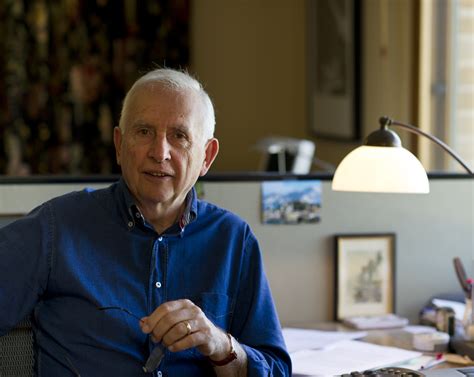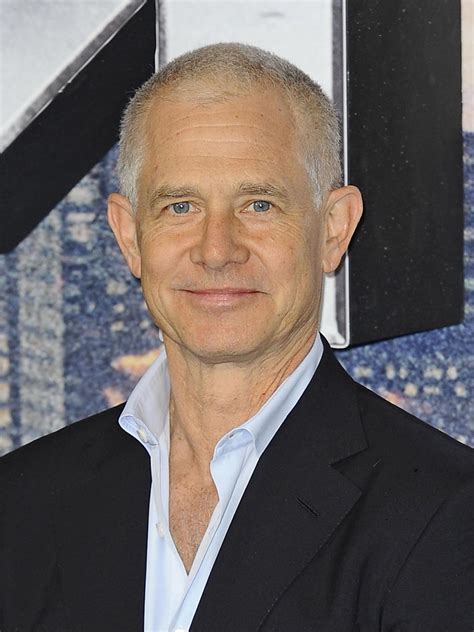A Quote by Charles Simic
Here in the United States, we speak with reverence of authentic experience. We write poems about our daddies taking us fishing and breaking our hearts by making us throw the little fish back into the river. We even tell the reader the kind of car we were driving, the year and the model, to give the impression that it’s all true. It’s because we think of ourselves as journalists of a kind. Like them, we’ll go anywhere for a story. Don’t believe a word of it. As any poet can tell you, one often sees better with eyes closed than with eyes wide open.
Quote Topics
About
Any
Anywhere
Authentic
Back
Because
Believe
Better
Breaking
Car
Closed
Driving
Even
Experience
Eyes
Eyes Wide Open
Fish
Fishing
Give
Go
Hearts
Impression
Journalists
Kind
Like
Little
Making
Model
Often
Open
Our
Ourselves
Poems
Poet
Reader
Reverence
River
Sees
Speak
States
Story
Taking
Tell
Than
Them
Think
Throw
True
United
United States
Us
Were
Wide
Word
Write
Year
Related Quotes
True friends see who we really are, hear our words and the feelings behind them, hold us in the safe harbor of their embrace, and accept us as we are. Good friends mirror our best back to us, forgive us our worst, and believe we will evolve into wise, wacky, and wonderful old people. Dear friends give us their undivided attention, encourage us to laugh, and entice us into silliness. And we do the same for them. A true friend gives us the courage to be ourselves because he or she is with us always and in all ways. In the safety of such friendships, our hearts can fully open.
Then we have the silence of the eyes which will always help us to see God. Our eyes are like two windows through which Christ or the world comes to our hearts. Often we need great courage to keep them closed. How often we say, I wish I had not seen this thing, and yet we take so little trouble to overcome the desire to see everything.
We all have love stories that go terribly wrong; we all have horribly broken hearts. And somehow we endure. We're not destroyed by it. We endure and go on to do interesting things and have worthy lives, even though we carry our heartbreaks with us. That's a kind of personal story of mine that I don't think I would tell in memoir but I do think I can tell in fiction.
When we can't hold back, or set boundaries, on what comes from our lips, our words are in charge-not us. But we are still responsible for those words. Our words do not come from somewhere outside of us, as if we were a ventriloquist's dummy. They are the product of our hearts. Our saying, "I didn't mean that," is probably better translated, "I didn't want you to know I thought that about you." We need to take responsibility for our words. "But I tell you that men will have to give account on the day of judgment for every careless word they have spoken" (Matt. 12:36).
For me, promotional thing about some new album coming out destroys a lot of the excitement of making records. Records, movies, books - they're not supposed to be like math books. The purpose of them is to kind of take us out of ourselves and give us some sort of alternate experience or respite. To try to maximize the relationship of listening to a record through promotion is like experiencing driving a car by reading about stimulus programs. It kind of defeats the purpose.
We all want explanations for why we behave as we do and for the ways the world around us functions. Even when our feeble explanations have little to do with reality. We’re storytelling creatures by nature, and we tell ourselves story after story until we come up with an explanation that we like and that sounds reasonable enough to believe. And when the story portrays us in a more glowing and positive light, so much the better.
Let me tell you about the very rich. They are different from you and me. They possess and enjoy early, and it does something to them, makes them soft where we are hard, and cynical where we are trustful, in a way that, unless you were born rich, it is very difficult to understand. They think, deep in their hearts, that they are better than we are because we had to discover the compensations and refuges of life for ourselves. Even when they enter deep into our world or sink below us, they still think that they are better than we are. They are different.
Poems give us permission to be unsure, in ways we must be if we are ever to learn anything not already known. If you look with open eyes at your actual life, it's always going to be the kind of long division problem that doesn't work out perfectly evenly. Poems let you accept the multiplicity and complexity of the actual, they let us navigate the unnavigable, insoluble parts of our individual fates and shared existence.
One of the most important responsibilities of leaders in any setting - including business organisations - is to tell us our own story; to explain us to ourselves; to help us weave some meaning and purpose into the fabric of our lives; to illuminate our understanding of where we have come from; to paint word pictures of our future onto which we can project our aspirations.
The real game of Bigger and Better that Jesus is playing with us usually isn't about money or possessions or even our hopes. It's about our pride. He asks if we'll give up that thing we're so proud of, that thing we believe causes us to matter in the eyes of the world, and give it up to follow Him. He's asking us, 'Will you take what you think defines you, leave it behind, and let Me define who you are instead?'
I think the key for us is really letting the stories we feel are best told to kind of dictate where we go. When we find a story we really believe is one that should be told, how do we best tell it and you know what do we need to tell that story most effectively? I think to the good, the universe is such that there are a lot of options, there a lot of opportunities. So that's kind of what's guiding us.
However we may flatter ourselves to the contrary, our friends think no higher of us than the world do. They see us through the jaundiced or distrustful eyes of others. They may know better, but their feelings are governed by popular prejudice. Nay, they are more shy of us (when under a cloud) than even strangers; for we involve them in a common disgrace, or compel them to embroil themselves in continual quarrels and disputes in our defense.
The relationships we have with our doctors are often the most trusted relationships of our lives. Our doctors tell us hard truths that others will not. We often tell our doctors what we will not tell others. We trust our doctors to give us the good, the bad and the ugly about our health so that each of us can make an informed decision.







































